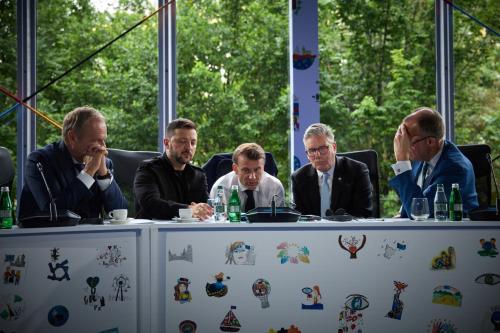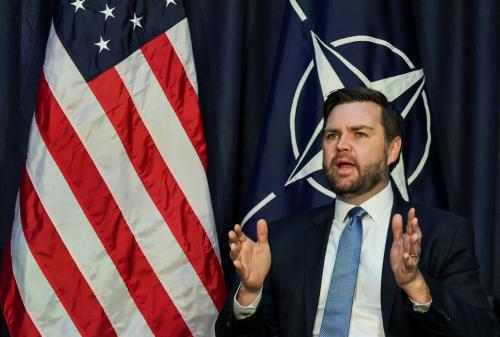President Bush and his fellow NATO heads of state have a critical opportunity to address the deteriorating situation in Afghanistan in their upcoming summit on November 28 in Latvia. Five years after the fall of the Islamic Emirate of Afghanistan, the Taliban movement has made a significant comeback. Those who placed the Taliban in the “dustbin of history” have been proven wrong. Today, the Taliban is the prime mover in the insurgency in south and east Afghanistan.
Taliban attacks on NATO forces are a daily phenomenon. British Army commanders have said the fighting in the south is the toughest the British Army has faced since the Korean War in the 1950s. In September, there were 600 attacks by insurgents, up from 300 in March and 130 a year ago. Suicide attacks on Afghan government, NATO, and U.S. forces and Afghan civilians have increased dramatically. There were two suicide operations in all of Afghanistan in 2002; today one occurs every five days. And the Taliban leadership, along with Al-Qaida leadership, is still at large and still planning attacks on its enemies in Afghanistan and globally.
These developments are remarkably close to the script Taliban leader Mullah Omar, the self-proclaimed Commander of the Faithful, outlined in late 2001 and early 2002 right after the fall of Kabul. At the time, Omar lamented the “catastrophe” of the Emirate’s fall but said that he and his organization would survive and return to challenge the coalition and its Afghan backers over time. Early on he said, “I am considering two promises. One is the promise of God, the other of Bush. The promise of God is that my land is vast. If you start a journey on God’s path, you can reside anywhere and will be protected. The promise of Bush is that there is no place on earth where you can hide that I cannot find you. We will see which promise is fulfilled.”
Mullah Omar also put the Taliban struggle after 2001 in a wider context from the start. He associated his movement with other Islamic struggles against perceived foreign occupiers, especially Palestine, Kashmir, and Iraq. In his most recent message in October 2006, he praised Muslim fighters everywhere, and especially in Iraq, for fighting America. A constant theme in his rhetoric was that the Taliban will defeat the U.S. and NATO just as the Mujahedin defeated the Soviet Union and the Warsaw Pact in the 1980s. This history is important. Like most people, Afghans remember who promised what. Validation occurs when you are seen to be right.
Winter is fast approaching in Afghanistan and the fighting season will come to an end for 2006. As long as NATO keeps forces in the country, the Taliban cannot march on the cities and retake the country. But that is not Mullah Omar’s objective. He now seeks to demonstrate that the Karzai government and NATO cannot effectively govern large parts of the country. As an insurgency, the Taliban wins by not losing.
When the NATO allies gather at their summit in Riga their goal must be to halt Afghanistan’s slide into chaos before it is too late. NATO Secretary General Jaap de Hoop Scheffer has been pleading with the allies for months for more troops and more airpower to fight the insurgency.
But even more critical than filling these shortfalls in the security situation is the need for a massive reconstruction effort in Afghanistan. This country needs the world community to deliver much larger packages of aid and assistance than have been delivered so far. Afghanistan needs a strong affirmation of support in Riga and an equally strong commitment of resources — military and financial — to stop the Taliban resurgence. The allies need to redouble their efforts and secure more help from non-NATO country donors as well. India, for example, has been one of the largest aid donors to Afghanistan since 2001 because it recognizes the danger of Taliban extremism from another failure in Afghanistan. NATO should reach out to India to do more together.
And the allies need to engage Pakistan as well. President Bush was right to bring together Presidents Musharraf and Karzai over dinner last month in the White House, but a lasting change in Pakistan policy is more than just an American responsibility. Pakistan created a stew of extremism and terror in the 1980s, with more than a little encouragement from Washington. That stew got uglier and uglier over time. Pakistan’s own internal problems complicate the issue further. Pakistan has tried to be selective in removing those elements of the stew it finds too dangerous and unpleasant today, but the real answer is to end its association with all of these groups; Qaida, Taliban, and Kashmiri once and for all. That is the hard message the allies should send from Riga.
Finally, the U.S. needs to create a special coordinator to work for Afghanistan-a senior figure with the bureaucratic and political clout to get Afghanistan what it needs. Today, there is no such figure. Rather, Afghanistan is too often blurred with Iraq in the same command chain.
The stakes in Afghanistan are high. With the growing disillusionment with the war in Iraq in America and elsewhere, there is a real risk that Afghanistan will be branded as just another failed mission. Mullah Omar is counting on that and encouraging the Iraqi resistance. But whatever we do in Iraq, we cannot afford to fail again in Afghanistan. Afghanistan is where al-Qaida planned and prepared for 9/11. Its leadership is still there. Afghanistan is NATO’s first significant out-of-Europe operation, and its first ever land war. Failure would probably consign the alliance to irrelevance.
The Brookings Institution is committed to quality, independence, and impact.
We are supported by a diverse array of funders. In line with our values and policies, each Brookings publication represents the sole views of its author(s).



Commentary
Op-edAfghanistan: The Taliban Resurgent and NATO
November 28, 2006